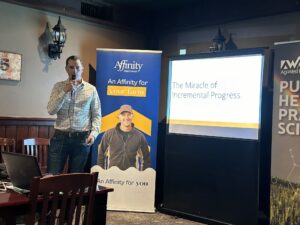Change often happens so gradually that we don’t even notice.
Looking at a 20-year-old aerial image of the family farm near Fillmore, Saskatchewan, it suddenly struck Jake Leguee just how much the farm had progressed.
Leguee was the guest speaker at Sprouting Success in Carlyle, co-hosted by Ag-West Bio, Affinity Credit Union and Global Agri-Food Advancement Partnership. His talk focused on agriculture and resonated with the audience – primarily local farmers – who came for supper and a night out at The Office Bar & Grill.
“When I started university in 2006, farming was not a place people wanted to be. Prices were terrible. Land prices had been collapsing for 20 years. It was a pretty depressing time in the industry.”
When he graduated four years later, things were looking up. Commodity prices had risen, land prices were changing, the word was out that developing countries needed to be fed, and “everybody was going farming.”
Of course, Mother Nature had many little surprises in store for the young farmer. “She kind of had a look at my dreams and patted me on the head and said ‘those are pretty cute’,” he said, eliciting laughter from the audience. His second year – 2011 – was so wet that only 20 per cent of the land could be seeded. But the Leguees persevered, and many lessons came from dealing with the challenges, including:
- If the crop fails, don’t let it be your fault. Take control of what you can control; invest in technology, knowledge and data.
- Think like a business. Find and listen to advisors. Learn key business practices, like strategic planning. Figure out your core values and operate accordingly.
- Success takes more than luck. Research shows that setting goals and investing in management skills pays off.
- Celebrate even the small wins. It helps prevent burnout and keeps you motivated.
One of Leguee’s pet peeves is when people with no connection to agriculture and no understanding of what it’s like to run a farm or make a living off the land push their views about farming. They often use the word ‘transform.’
“But agriculture has always been transforming. It’s just always transformed from the ground up, based on decisions that farmers make individually that work for their farms, that end up moving the whole industry forward,” he says.
This attitude is not new. Two centuries ago, Thomas Malthus claimed agriculture would never keep up with population growth. Leguee says innovators proved Malthus wrong time after time.
In the early 1900s, the Haber-Bosch process revolutionized agriculture by making nitrogen fertilizer readily available; in the 1960s Norman Borlaug’s dwarf wheat varieties prevented mass starvation; in the ‘90s herbicide tolerant crop varieties and direct-seeding / no-till techniques helped reduce soil erosion, while sequestering tons of CO2. Today, precision agriculture is making production even more efficient and sustainable. “The innovations just kept coming and continuing to change the Prairie landscape,” says Leguee.
“Can we finally put Malthus to rest?” asks Leguee, “He was wrong. 100% completely, incontrovertibly wrong.”
Farming may be a great lifestyle, but farmers can’t continue to operate if they don’t make money.
“Farmers won’t do something unless it actually drives a return for their farm,” says Leguee. “There has to be a reason for it.” They adopt technologies that make their operations more profitable and improve their livelihoods. “Agriculture, profitability and environmental sustainability often go hand in hand.”
Leguee wants people to understand just how much better life is now than in the romanticized past. He points out three ‘superheroes’ who saved countless lives: John Enders, who created the first measles vaccine; Howard Florey, who developed penicillin; and Karl Landsteiner, with his discovery of blood groups.
“The world before our time was overwhelmingly a place of tiny coffins. Childhood mortality has collapsed from 40 to 3.7 per cent in the past century alone. Life expectancy has risen from 35 years of age in 1800 to the high 70s or even 80s today.”
Leguee notes that farming was once backbreaking work, often producing barely enough food for survival. Today “we have far more leisure time; we can travel, we can taste foods from around the world anytime we want.”
He ended his talk with a cautionary note: We need to be grateful for what we have and realize how easily we can lose it.
“The miracle of incremental progress isn’t guaranteed to continue. It has happened because of science, education, and advances in agriculture. We are living longer and happier, healthier, easier lives than our ancestors could ever have imagined. The miracle of incremental progress is all around us. We just have to dream big enough and recognize our successes when they’re staring us in the face.”



Jake Leguee, his sister Sarah and brother-in-law Erik Nikolejsin were named Outstanding Young Farmers in 2023.
Jake serves as Chair of the Saskatchewan Wheat Development Commission. He is the author of A Year in the Life of a Farmer.
Previous Article – Essentials for Business Excellence webinar series Next Article – NRGene Canada Launches the North American Insect Center for Sustainable Protein Production
